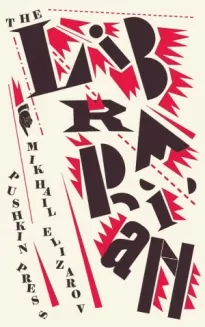The Librarian

- Автор: Михаил Елизаров
- Жанр: Современная проза / Социальная фантастика
- Дата выхода: 2015
Читать книгу "The Librarian"
From the artistic point of view the book was a lot weaker than The Proletarian Way. The negative characters were written too grotesquely, like caricatures in the magazine Krokodil. The text was indelibly stained with the newspaper ink of populistic leading articles: “They joyfully appreciated the grandeur and beauty of nature, its wisdom and generosity, and spared no efforts to set the golden ears of wheat waving above the empty land.”
Unfortunately there was no one for me to influence with my Power. No one saw the majestic expressions of my face; no one heeded the imperious modulations of my voice. I hurled my lightning-bolt glances at the walls, the door and the dumb waiter in vain.
The third Book they sent was one I was already familiar with—the Book of Meaning, with its neat insert. The fourth was the Book of Joy (Narva), a military novel about anti-aircraft gunners. Leaving aside the short lyrical passages with descriptions of the lives of the main characters and several pastoral sections at the beginning of the novella, the plot unfolds in the space of a few heroic days. February 1943. An anti-aircraft and machine-gun platoon from a ski battalion has dug in on the western bank of the Narva River. Supported by tanks, Hitler’s forces attack the positions of the Soviet warriors. The defence is headed by Lieutenant Golubnichy. The main forces of the battalion wage stubborn battle against the enemy’s tanks and infantry along a small bridgehead on the other side of the river. It is impossible to get the heavy gun across from the eastern bank to the western one—the ice on the Narva is broken. By the end of the day there are only three members of the machine-gun formation remaining—Golubnichy and two privates, Martynenko and Tishin. In the evening Lance-Corporal Sklyarov manages to get through to them and deliver ammunition. After a powerful mortar attack the German forces advance again. Martynenko is killed. Golubnichy and Sklyarov, both wounded, load the ammunition belts and Tishin runs from one machine gun to another so that the enemy won’t guess that there is only one warrior left unwounded at the position. When the Fascists break in, Golubnichy sends a signal rocket to call down the fire of our artillery on himself. The flames of explosions rage above the position and the Hitlerites flee in panic. Units from a Guards’ rifle division arrive and make a forced crossing of the Narva…
Joy in its pure form had no admixture of merriment and jocularity. There was only exultation and jubilation of the spirit. All the bitterer was the shift of mood when the feeling of rapture was replaced by a withdrawal full of hopeless despair.
I had no doubt that the pragmatic Gorn had the role of a sacrificial “reader” in mind for me right from the beginning. How bitterly I regretted that I had not been killed at the village soviet together with the other Shironinites. Someone who is destined to be hanged should pray to his rope and make confession to his piece of soap, because if he decides to drown instead, it will be torment. I would gladly have exchanged the job of running round in closed circles for a glorious and rapid death from a hook or an axe.
For many days I used the Book of Joy like vodka, to numb my fear, immersing myself twice a day in an iridescent state of ecstasy. I tried to time the reading so the final pages would coincide with the retro music programme. That way the effect of the Book lasted for almost twice as long.
As a result of this binge reading I even had hallucinations a few times. I heard footsteps outside the door, heard the bolt opening with a rusty screech, or I heard the late Margarita Tikhonovna’s voice in the shaft of the dumb waiter, discussing my lunch menu with someone. She was trying to persuade them that “Alyosha has hated chicken since he was little”.
I realized that I was being hoodwinked by auditory hallucinations, but even so I shouted to her and asked her to get me out of the bunker. For lunch I was given macaroni and a pimply chicken leg…
This went on until they sent the Book of Endurance. The anaesthetized indifference to everything that this Book induced suited me far better: unlike Joy, Endurance left almost no fleshly hangover.
I deliberately read the Book of Fury (By Labour’s Roads) without observing the Conditions. I didn’t want to reduce myself to the state of a berserk. I had no one to fight and, in addition, I was afraid of damaging myself in my blind fury.
I can say in brief that the Book told the story of a working-class dynasty, the Shapovalovs, and how a small factory for repairing agricultural equipment grew into a metallurgical combine with automated production lines, and the village of Vysoky grew into a city.
I waited for the seventh and final Book, the Book of Memory. I had no doubt that it would appear. The dumb waiter had turned from a provider of food into an instrument of exquisite torture. My heart was in my mouth every time I opened the cover. After all this exhausting agitation I couldn’t eat a bite; I even suffered from nervous vomiting. Only the artificial endurance saved me.
I didn’t need to wonder exactly how the old women would force me to start reading the Books. The mechanism of compulsion was obvious. When the dumb waiter fell silent, Alexei Vyazintsev would be faced with a fairly simple choice: starve to death or become the talisman of the country. I feverishly stuffed the drawers of the desk with bread.
Of course I was aware that no matter how much I stored up, the rusks would run out. There was no escaping the fate of the reader and curator; I could only drag out the time, hoping that something unimaginable might happen “on the off chance”. What if there really were only one copy of the Book of Strength after all? What if Gorn and the fourteen elders had been weakened and died long ago? That meant that sooner or later the leadership would change up above. The new female ataman would want to recover the invaluable Book from the basement. They would have to reach an agreement with me, and I would haggle…
This state of suspense was worse than having my conviction put into effect. But they left me alone for three months as if on purpose. My storage bins were bursting. Like a miser, I arranged the slices of bread I had saved into loaves like bricks—I had fourteen and a half of them. These reserves would last me until summer, and even longer if eaten like Leningrad siege rations.
I was bored now; my writing task was basically completed. I had begun with a brief overview of the Gromovian universe, on the basis of materials found in Gorn’s archives, and also described my own brief time as a librarian, the glorious death of the Shironin reading room and even my first months in the bunker. Now the narrative had taken itself by the tail. There was nothing left to reveal, except by supplementing what had already been written…
One morning in April or May I opened the cover. The Book of Memory was lying in the top and the bedpan in the bottom. There wasn’t any food or water.





